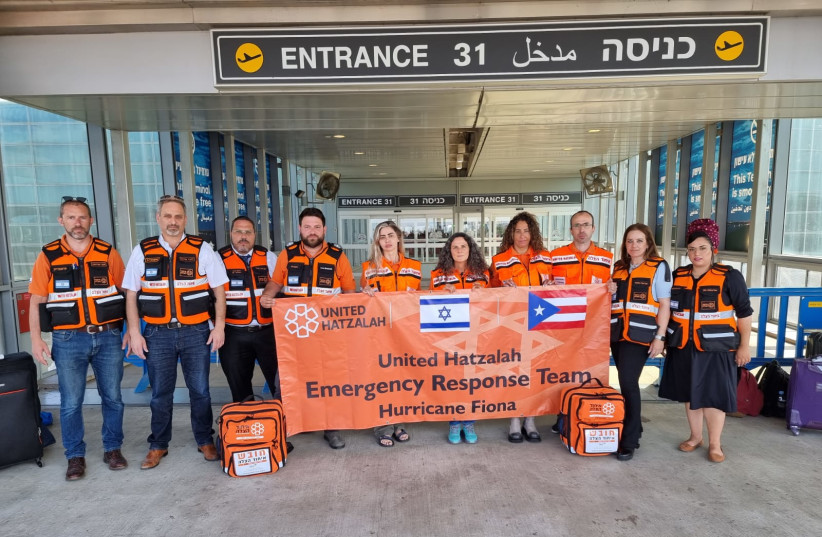As Puerto Ricans are left reeling and working to rebuild after Hurricane Fiona slammed the area earlier this month, United Hatzalah of Israel has sent a delegation to provide psychological and medical aid.
Already struggling to recover more than five years after the devastation of Hurricane Maria, the Puerto Rican population is now dealing with remnants of a complete power failure after Fiona made landfall on September 18, as well as a shortage of drinking water and major flooding that wiped out much of the recently replaced infrastructure. With poverty rates significantly higher than those found on mainland United States and limited access to resources in much of the US, Tamar Shlesinger felt it imperative to help.
Shlesinger is an Israel-based social worker and Hatzalah volunteer. “I landed in San Juan, Puerto Rico, on Friday morning with my five partners, all United Hatzalah volunteers with a background in psychological treatment and emergency medical aid,” she said. “After members of the local Jewish community warmly welcomed us at the Chabad house, we started by trying to identify the needs of the population.”
“Imagine what it is like to rebuild your house for the second time, fearing that it might be destroyed again within the next few years,” she continued.
According to Shlesinger, Levid Ortiz, the director of PR4PR (Puerto Rico for Puerto Rico), has been spearheading support efforts for many of the underprivileged communities.

An encounter with Norma
She said an encounter from the mission that most stands out was meeting Norma, an elderly woman.
“She did not speak English, so I asked her granddaughter to act as an interpreter. She started speaking in Spanish, looking very emotional, and soon she burst out crying, looking submerged with emotion. She continued speaking for a long time, while I waited patiently for the translation, convinced that it would be an expansive account of the difficulties she was dealing with," Shlesinger said.
"When her granddaughter finally translated, it turned out that this woman, whose body language seemed to reflect enormous pain, was talking about the fact that despite her sadness over her destroyed house, she was incredibly thankful that everyone in her family was healthy. She saw meaning in the fact that her family was able to help others, as her son, an engineer, was taking part in efforts to rebuild houses,” she said.
“The ability to acknowledge the pain and the anxiety about the future on the one hand, while continuing to look at things with a broader perspective and see meaning in giving to others on the other hand, was extremely moving to me. While a lot of work awaits us, Norma gave me hope that we will find the resilience to build on within the local population. I look forward to the days ahead and helping more people learn how to cope with the anxiety that they are facing in the wake of this, another storm that has ravaged their homes.”
Comparing Fiona and Maria
Striking Puerto Rico on September 20, 2017, Maria killed about 3,000 people in its wake, left an estimated $90 billion in damages and sparked an exodus of residents to the US mainland, including some of the island’s 2,500 or so Jews. It took nearly a year to restore electricity amid a fiscal crisis exacerbated by a magnitude-6.4 earthquake in January 2020 and a collapse of public finances.
By comparison, Hurricane Fiona – which struck southwestern Puerto Rico five years later on September 18 as a Category 1 storm, two calendar days before Maria – has been less destructive. It killed eight people on the island, largely sparing the San Juan metropolitan area.
Both disasters struck around the Jewish High Holy Day season.
Diego Mandelbaum, the full-time religious director of Congregation Shaare Zedek, a Conservative synagogue in San Juan’s upscale Miramar neighborhood, distributed 30 pallets of water to flooded residents in eastern Puerto Rico.
“We were lucky because we still have enough diesel for several days. We are using donated funds to help six communities in Loiza,” said Mandelbaum, who expected the congregation to have between 150 and 200 worshippers for Rosh Hashanah services.
Established in 1952, Shaare Zedek is the oldest of Puerto Rico’s three synagogues. Most of its members are native Spanish speakers who emigrated from Cuba after Fidel Castro came to power in 1959, though Mandelbaum — a lawyer by profession — is from Argentina.
“We’re OK and our synagogue suffered no physical damage,” Mandelbaum said. “The only problem we face right now is that many of our members are without electricity. We do have a generator that’s running as we speak, but we don’t have any idea when the grid will be back online.”
JTA contributed to this report.
